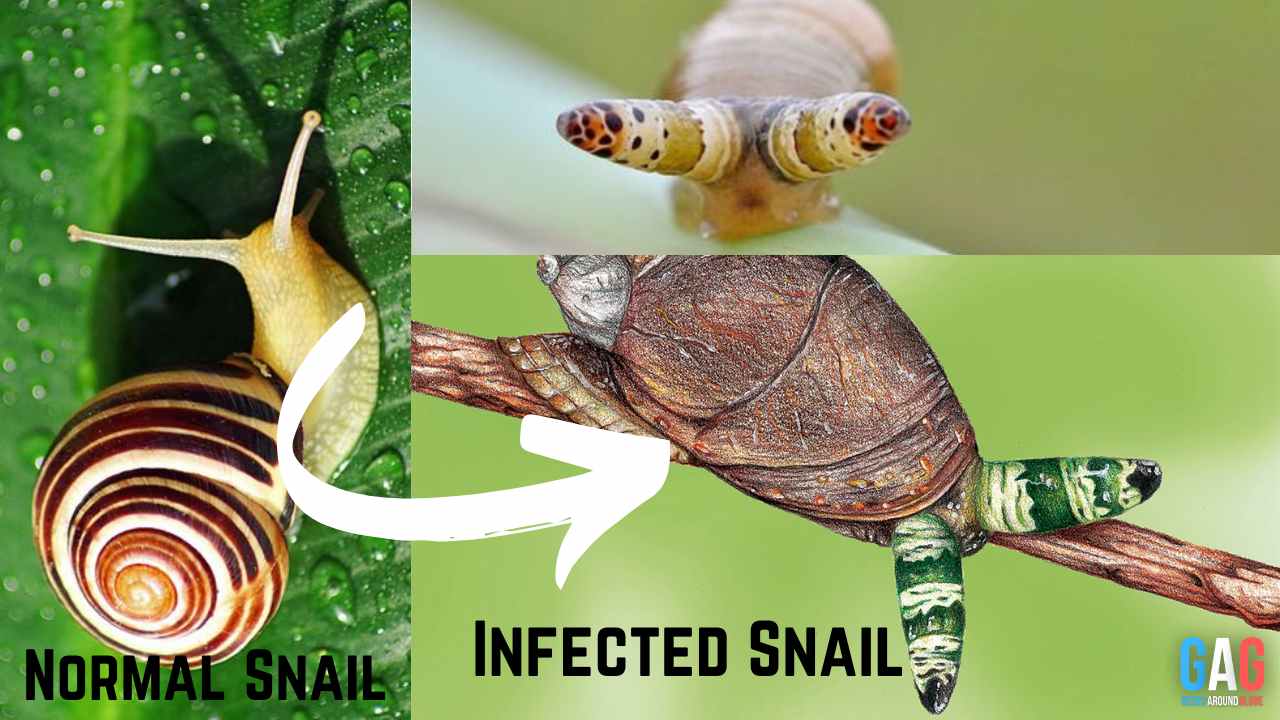First Zombie Ants then Snails: Could this direct to Human Zombies? | Zombie snails found in Europe and American forest
In the intricate tapestry of the animal kingdom, where creatures large and small interact in fascinating ways, a peculiar phenomenon known as parasitic manipulation has captured the attention of scientists and curious minds alike. Imagine a parasite that controls its host’s thoughts and actions for its own benefit. Zombie creatures, such as zombie ants and now zombie snails, are a fascinating and intriguing topic in the field of study. The concept seems lifted from the pages of a science fiction tale. Let’s find out how snails become Zombies and can it affect humans. How Snails Become Zombie Snails? Picture a peaceful garden scene: a snail leisurely gliding along, seemingly oblivious to the world around it. Enter Leucochloridium paradoxum, a parasitic flatworm with an astonishing ability…
In the intricate tapestry of the animal kingdom, where creatures large and small interact in fascinating ways, a peculiar phenomenon known as parasitic manipulation has captured the attention of scientists and curious minds alike.
Imagine a parasite that controls its host’s thoughts and actions for its own benefit. Zombie creatures, such as zombie ants and now zombie snails, are a fascinating and intriguing topic in the field of study. The concept seems lifted from the pages of a science fiction tale.
Let’s find out how snails become Zombies and can it affect humans.
How Snails Become Zombie Snails?
Picture a peaceful garden scene: a snail leisurely gliding along, seemingly oblivious to the world around it. Enter Leucochloridium paradoxum, a parasitic flatworm with an astonishing ability to manipulate its snail host. The parasitic flatworm takes up residence within the snail’s body, intricately weaving its way into the creature’s neural circuits. As a result, the once-normal snail undergoes a macabre transformation. Its behavior becomes erratic, its movements unusual, and its appearance grotesque.
The parasitic flatworm exerts control over the snail’s actions, driving it to positions more likely to be spotted by birds. But why? The answer lies in the parasite’s cunning survival strategy. The manipulated snail becomes an unwitting puppet, a tantalizing temptation for birds hunting for a quick and easy snack. Upon ingestion, the flatworm’s journey continues within the bird, allowing it to reproduce and continue its life cycle.
Zombie Snails Found in Europe and American Forests
This isn’t from fiction. Zombie snails, under the influence of Leucochloridium paradoxum, have been discovered in forests across Europe and the Americas. Various parts of the world have reported sightings of zombie snails, from the lush woodlands of Europe to the vast forests of North and South America.
Intriguingly, scientists are not merely captivated by the eerie spectacle of zombie snails, but they also recognize the significance of these findings for ecological research. Studying these peculiar interactions sheds light on the delicate balance of ecosystems and the complex relationships that shape life on our planet.

Not only snails there were Zombie Ants
The world of parasitic manipulation doesn’t stop at snails. The case of zombie ants is equally mind-boggling. The Ophiocordyceps fungus targets ants, infiltrating their bodies and compelling them to climb vegetation. Once in a high, optimal location, the fungus forces the ant to bite down and cling onto a leaf, sealing its fate. The fungus then sprouts from the ant’s body, releasing spores that rain down on unsuspecting ant colonies below, perpetuating its life cycle.
Can humans affected by Leucochloridium paradoxum?
But could this gruesome form of parasitic manipulation extend to humans? While the world of science is full of surprises, the transition from snails to humans presents a complex and unlikely scenario. Unlike snails, human biology is far more intricate, and our minds are highly evolved. The challenges that parasites would face in manipulating human behavior are staggering, making such an occurrence exceedingly improbable.
How Parasite vs. Host Interaction Works?
In the grand tapestry of life, the delicate dance between parasites and their hosts unfolds through co-evolutionary dynamics. Hosts develop ingenious defenses against parasitic manipulation, forging a constant battle between control and resistance. These interactions, though often unsettling, contribute to the astonishing diversity of life and the delicate balance that keeps ecosystems thriving.
The Real Threats to Human Zombies
Parasitic creatures in the animal kingdom can have alarming effects on humans. However, the concept of humans turning into zombies is purely fictional. The notorious Toxoplasma gondii, for instance, can influence behavior in infected individuals, raising questions about the extent to which parasites can influence our minds.
Conclusion
Human zombies controlled by parasites are highly unlikely to become a reality due to the intricacies of human biology and behavior. In the end, the story of parasitic manipulation serves as a testament to the captivating and intricate nature of the world around us.






